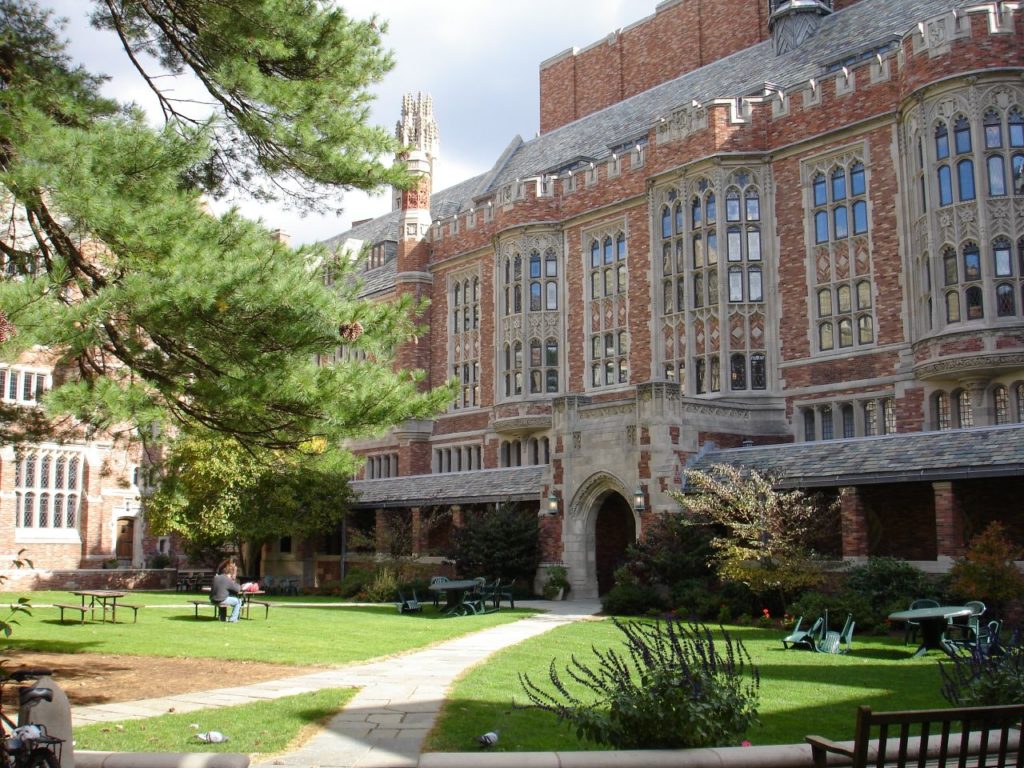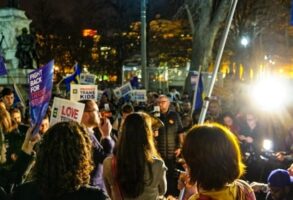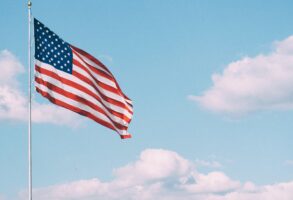
Published March 23, 2022
This time, it could be different. Typically, university administrators desperate to avoid disciplining students who silence visiting speakers downplay or deny the realities of shout-downs, deflecting public outrage until the heat dies down. Anything is better than meting out punishment to students who portray themselves as champions of disadvantaged minorities, or so most administrators think.
This is what is happening right now at Yale Law School in the aftermath of the March 10 shout-down of a Federalist Society panel that included a representative from Alliance Defending Freedom (ADF), a Christian legal organization devoted to the protection of freedom of speech and religious liberty. ADF’s faithful Christianity offended the about 100 law-student supporters of “transgender rights” who disrupted the event. Since that shout-down, Yale has issued misleading statements about the nature of its rules and the severity of what happened, all in the hope that discipline could be avoided. The need to dissemble is particularly great in this case, because Yale has perhaps the clearest, firmest, and most venerable requirements in the nation for sanctioning those who shout down speakers.
This time, however, it could be different. Although it has yet to be noted, Yale Law School’s “Rules of Discipline” allow any “member of the Law School” (which includes all Yale Law School faculty members and all Yale Law School students) to trigger an investigation and hearing regarding any alleged violation of Yale’s Law School Code. First and foremost in that code comes the obligation to protect “intellectual freedom.” According to Yale, intellectual freedom is necessary to preserve the “climate of calm” and “mutual respect” essential to the Law School’s life as a “house of reason.” All of this was clearly infringed by this month’s shout-down.
In particular, Yale’s rules of discipline prohibit any “threat” of the “use of physical force or violence to harass, abuse, intimidate, coerce, or injure any member of or visitor to the Law School or University.” Yale’s rules of discipline likewise prohibit “intentionally and substantially interfering with the conduct of classes, the administration of the Law School, or other University activities or functions, or with the freedom of movement, freedom of peaceable assembly, freedom to learn, or other rights of any member of or visitor to the law school or university.” There is substantial evidence that all of these rules of discipline were violated at the March 10 Federalist Society event.
The important point here is not that the rules of Yale Law School were violated by the shout-down. That’s obvious. No, the point is that in this case we needn’t depend on sniveling administrators to act. Any Yale Law School student or faculty member has the power to file a complaint, or rather a series of complaints, against those who participated in the shout-down. And according to Yale Law School’s Rules of Discipline, those complaints must be investigated and acted upon. So, for example, the members of Yale Law School’s Federalist Society who were present at the event, and whose freedom to learn was interfered with, can file complaints and initiate hearings.
This is easier said than done, of course. Whoever dares file such complaints risks being ostracized by the majority of Yale Law School students, whose sympathies are clearly with those who disrupted the event. Anyone who moves forward with a complaint also burdens himself with a great deal of time and trouble.
But the benefits of a complaint to society at large would be substantial. The campus free-speech crisis that moved into high gear around 2016 has now spread well beyond the academy. An open challenge to the impunity of campus shout-downs at a prestigious university could thus have a powerful demonstration effect on society as a whole. The most effective antidote to cancel culture would be delivered at the site of the original infection: university campuses.
It is true that Yale’s regulations, in combination with the bias of its administration and faculty, offer myriad ways to dilute, block, or effectively nullify a complaint. Nonetheless, given the facts of this case, and given Yale’s historic reputation as a die-hard opponent of campus shout-downs, it will be difficult to neuter this complaint without exposing the university’s betrayal of its own first principles.
In short, Yale Law School’s rules of discipline offer an unusual opportunity for students of principle and pluck to turn the tide against cancel culture. File a series of complaints against the perpetrators of the Yale Law School-ADF shout-down, and Yale’s administration will be forced to act. In acting, it will either uphold the university’s tradition of free speech or expose itself as having abandoned that vaunted tradition. Whatever happens will rivet America’s attention.
It’s important to note that Yale Law School’s disciplinary process could potentially be overridden by a “University-Wide Tribunal.” The University Tribunal is a special procedure, controlled by the university president, and designed to deal with cases that have “institutional significance for the integrity and values of the University as a whole.” While any disciplinary issue could potentially have such implications, Yale’s regulations specifically mention cases involving “disruption of free expression” as appropriate subject matter for a University Tribunal.
In better days, a University Tribunal would have been the ideal first resort in case of a shout-down. Given that Peter Salovey is Yale’s president, however, a presidentially controlled University Tribunal would be more likely to suppress the truth. Hearings based on complaints by Yale Law School students present at the Federalist Society event offer a more promising avenue. Salovey was president during the Yale Halloween costume controversy of 2015. Under his watch, Nicholas and Erika Christakis were driven from the university. And as revealed by a National Association of Scholars report on “Neo-Segregation at Yale,” Salovey’s Yale actually awarded prizes to some of the students who mobbed the Christakises.
It is possible, then, that if Yale Law students were to file complaints, Salovey might short-circuit the process by convening a University Tribunal. Again, however, given the facts of this shout-down, it will be exceedingly difficult for Salovey to cover up the truth once a University Tribunal has been initiated. Whatever Salovey wins in the court he controls can be lost in the court of public opinion.
Yale Law School’s public statements on the shout-down have been misleading, at best. According to Yale, the students who shouted down the Federalist Society panel ought not to be punished because they never violated the school’s “three-warnings protocol.” In this version of events, the students were read the first in a series of three warnings against disruption, then promptly left the room. After that, “the event went forward until its conclusion.”
That account is misleading in several respects. First, and above all, there is abundant evidence to show that the disruption continued well after the protesters decamped to the hallway. The noise just outside the panel was enough to seriously compromise the audience’s ability to hear. We know this from a series of recordings. The account of ADF attorney Kristen Waggoner — the main target of the shout-down — also directly contradicts the university’s version of events.
Second, while the full text of all three warnings in the “three-warnings protocol” was never read, this is irrelevant. The three-warnings protocol is in the nature of a suggestion about how to handle disruptions. It does not and cannot be used to nullify Yale’s overall policy, which is that students ought to be punished for disruptions, and that the university should attempt to warn them against such disruptions when possible.
Third, the student protesters on March 10 did in fact receive multiple warnings against disrupting the proceedings. They were read the text of the first warning in the “three-warning protocol.” It’s true that after the first warning the students moved to the hallway just outside the event. Yet those students were told as they moved: “You are welcome to be outside as long as you don’t disrupt the event.” In effect, that was a second warning, modified as appropriate from the formal text to suit the specific circumstance. Moreover, Yale Law School’s own public statement indicates that, “When students made noise in the hallways, administrators and staff instructed students to stop.”
The so-called “three-warnings protocol” is actually only a two-warnings protocol, since the third warning merely informs disruptors that police will now be clearing the protest. In this case, however, video evidence, as well as the university’s own statement, indicates that the disruptors actually received more than two warnings, all of which were blatantly disregarded. And while police were never called in to clear the disruptors, the police were called in to protect the speakers as they left the event.
In short, substantial evidence indicates that this was a genuine shout-down, that Yale’s rules were violated, and that the students involved merit discipline.
Yale’s reputation as a defender of campus free speech and a scourge of speaker shout-downs rests on its Woodward Report of 1974. The report chair, C. Vann Woodward, was famous for having advised Thurgood Marshall’s team as it argued for school desegregation in the 1954 Brown versus Board of Education decision. Martin Luther King, Jr. himself called Woodward’s book, The Strange Case of Jim Crow, “the historical bible of the civil rights movement.” It was striking that Woodward, a hero of the civil-rights movement, defended the right of even segregationists like Alabama Governor George C. Wallace to speak at Yale. In those days, liberals were actually liberal.
The Woodward Report recounted a decade’s worth of speaker disinvitations and cancellations at Yale on the way to making its recommendations. The culminating incident, called by the report the “worst” in a decade of free speech failures, was a shout-down. The event disrupted was to have been a debate in which the views of Stanford University physicist William Shockley — who believed that race is linked to intelligence — would be challenged by William Rusher, the conservative publisher of National Review. Despite several warnings from administrators, the Shockley-Rusher debate was shouted down and effectively canceled.
While twelve students from a much larger number of disruptors of the Shockley-Rusher debate were identified, found guilty, and suspended for the following term, they were allowed to effectively avoid the suspension with a simple promise of good conduct. It was this failure to seriously discipline a shout-down that evoked calls of protest from Yale faculty and students alike. Those calls led directly to the creation of the committee that published the famous Woodward Report.
The Woodward Report decried the fact that a significant number of students, and even some faculty, saw speaker disruptions as permissible and even desirable. The report said that shout-downs were encouraged by the belief among students “that there is a small chance of being caught, particularly among the mass of offenders; that if caught there is a relatively good chance of not being found guilty; and that if found guilty no serious punishment is to be expected.” The report bemoaned the fact that failure to discipline disruptors of the Shockley-Rusher debate lent credence to these assumptions.
Taking all of this into account, the Woodward Report reached the following conclusion: “It is plain . . . that if sanctions [for shout-downs] are to work as a deterrent to subsequent disruption, they must be imposed whenever disruption occurs. They must be imposed and not suspended. They must stick.” In 1974, the Woodward Report’s conclusions were lauded in the mainstream press and across the political spectrum.
Yale’s official policy for dealing with shout-downs derives directly from the Woodward Report. Although it’s obvious that Yale has repudiated this most famous defense of campus free expression in practice, if not in theory, Yale Law School’s Rules of Discipline provide a unique opportunity to force this once-great university to confront its obligations to intellectual freedom, and therefore to test its values. A few courageous Yale Law students now have an opportunity to change the national conversation on free speech. Let us see whether they take advantage of it.
Stanley Kurtz is a senior fellow at the Ethics and Public Policy Center.
Image: Step, CC BY 2.0, via Wikimedia Commons
Stanley Kurtz is a Senior Fellow at the Ethics and Public Policy Center. Beyond his work with Education and American Ideals, Mr. Kurtz is a key contributor to American public debates on a wide range of issues from K–12 and higher education reform, to the challenges of democratization abroad, to urban-suburban policies, to the shaping of the American left’s agenda. Mr. Kurtz has written on these and other issues for various journals, particularly National Review Online (where he is a contributing editor).








